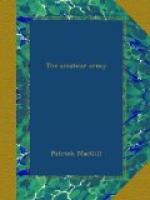“Bread and cheese for breakfast,
For dinner Army stew,
But when it comes to tea-time
There’s dough and rind
for you,
So
you and me
Won’t
wait for tea—
We’re jolly big fools
if we do.”
But those who do not live in billets, and whose worldly wealth fails to exceed a shilling a day, must be content with Army rations, with the tea tasting of coom, and seldom sweetened, with the pebble-studded putty potato coated in clay, with the cheese that runs to rind at last parade, and, above all, with the knowledge that they are merely inconvenienced at home so that they may endure the better abroad.
There is another school of theorists that states that an army moves, not upon its stomach, but upon its feet, the care of which is of vital importance. This, too, finds confirmation in the official pamphlet, which tells the soldier to “Remember that a dirty foot is an unsound foot. See that feet are washed if no other part of the body is,” etc.
My right foot had troubled me for days; a pain settled in the arch of the instep, and caused me intense agony when resuming the march after a short halt; at night I would suddenly awake from sleep to experience the sensation of being stabbed by innumerable pins in ankle and toes. Marching in future, I felt, would be a monstrous futility, and I decided that my case was one for the medical officer.
Sick parade is not restricted by any dress order; the sore-footed may wear slippers; the sore-headed, Balaclava helmets; puttees can be discarded; mufflers and comforters may be used. “The sick rabble” is the name given by the men to the crowd that waits outside the door of the M.O.’s room at eight in the morning. And every morning brings its quota of ailing soldiers; some seriously ill, some slightly, and a few (as may be expected out of a thousand men of all sorts and conditions) who have imaginary or feigned diseases that will so often save “slackers” from a hard day’s marching. The aim and ambition of these latter seem to be to do as little hard work as possible; some of them attend sick parade on an average once a week, and generally obtain exemption from a day’s work. To obtain this they resort to several ruses; headaches and rheumatic pains are difficult to detect, and the doctor must depend on the private’s word; a quick pulse and heightened temperature is engendered by a brisk run, and this is often a means towards a favourable medical verdict—that is, when “favourable” means a suspension of duties.
At a quarter to eight I stood with ten others in front of the M.O.’s door, on which a white card with the blue-lettered “No Smoking” stood out in bold relief. The morning was bitterly cold, and a sharp, penetrating wind splashed with rain swept round our ears, and chilled our hands and faces. One of the waiting queue had a sharp cough and spat blood; all this was due, he told us, to a day’s divisional field exercise, when he had to lie for hours on the wet ground firing “blanks” at a “dummy” enemy. Another sick soldier, a youth of nineteen, straight as a lance and lithe as a poplar, suffered from ulcer in the throat. “I had the same thing before,” he remarked in a thin, hoarse voice, “but I got over it somehow. This time it’ll maybe the hospital. I don’t know.”




